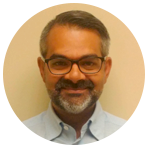By Josephine Li

Wayne van der Meide
Wayne van der Meide, one of Legal Aid Ontario’s (LAO) co-leads for its Racialized Communities Strategy, experienced an “astonishing” moment when he was meeting with a settlement agency to talk about what LAO does.
“It was astonishing when we would say LAO could cover all of these different legal issues and the response was, ‘Really?’” Wayne recalls. “It just felt like LAO had dropped the ball in terms of getting the word out about how it can help.”
That’s something that Wayne and his co-lead, Kimberly Roach, have heard over and over again as they’ve begun meeting with community agencies that work predominantly with racialized communities. He continues to be surprised that there’s still such a lack of understanding about Canadians’ rights, what LAO does and the availability of legal aid services.
A mother who knew to “fight back”
Wayne knows what a big difference it makes when you understand your rights.
Though he was born in Canada, his family moved to Trinidad when he was nine. When they returned to Canada several years later, he remembers how the school wanted him to repeat a year because they didn’t accept that the education system in Trinidad was, as Wayne puts it, “essentially a year advanced.”
“It gets better,” he recalls. “They wanted to put me in ESL. And, I don’t know if you know this, but Trinidadians speak English—that’s our language.”
Fortunately for Wayne, he has a mother who was also a Canadian and who knew to fight back, insisting he didn’t need to be held back or put into ESL.
“Most of my best friends, then and now, are racialized people, who did not have that advantage and weren’t so lucky.”
A lack of awareness about rights in racialized communities
Wayne believes public legal education needs to be more of a core function at LAO.
He firmly supports LAO’s current work of translating some of its brochures and fact sheets, which explains its services, into some of the most requested languages. It’s just one simple step towards better serving a vast population comprised of many communities.
In addition, various districts have advice lawyers doing community outreach—but he thinks there needs to be more of this type of work because it’s so critically important.
He points to an example of meeting with social justice workers who were deeply committed to helping others, but who still didn’t understand that treating everyone the same” wasn’t necessarily the most helpful one for reaching everyone in need of services.
He recalls asking, “Is there anything you do different here to ensure that you are effectively reaching out to and serving members of racialized communities?”
The answer, with great pride, was, “Absolutely not. We treat everybody equally.”
Wayne adds, “My point is: if services that are accessible to rich people are equally available to poor people, there’s a good chance that they’re not accessible to poor people.”
Broadening the conversation about race
“Sometimes, when you talk to people about issues surrounding race, they immediately get defensive,” Wayne said. “People think of racism as some sort of moral issue. If I am happy to welcome a Black person to dinner, I am not a racist.”
But, as Wayne puts it, “That does not mean that we don’t have an obligation to fix systems that discriminate against racialized people.”
Wayne thinks a broader conversation needs to be had about the experiences of racialized people and the systemic disadvantages that they face—disadvantages that are not in plain sight.
Drawing on a sense of “otherness”
To a certain extent, he understands what those disadvantages are. Wayne always felt a sense of “otherness” because he had one foot in several different identities.
“I’m mixed race, for one thing,” he explains. “My father is White, and my mother is South Asian from Trinidad. Plus, I’m gay. And I’ve never felt like I could fully be myself in the Caribbean community, in the gay community, or in any of the various social spheres that I’ve been set in.”
He applauds the Black Lives Matter sit-in at the Toronto Pride Parade, which essentially ground festivities to a halt. Alexandra Williams, one of the co-founders of Black Lives Matter in Toronto, told media outlets, “It’s always the appropriate time to make sure folks know about the marginalization of black people, of black queer youth, black trans youth, of black trans people.”
Wayne thinks that the actions of Black Lives Matter at the Pride Parade are a clear example of how “the LGBTQ community includes a wide population of racialized and low-income people—and Pride Toronto has lost touch with them.”
Re-engaging with the community
The fact is, over the past 20 years, there has been an overrepresentation of racialized communities in the justice system. While people of colour make up almost 26% of Ontario’s population, 19% of Ontario’s families from racialized communities live in poverty, compared to just 6% from non-racialized communities.
This state of poverty has led to a variety of issues including increased rates of homelessness, lack of access to education, fair work, healthcare or police protection, and barriers to employment and overrepresentation in low-paying, unstable jobs. Added to this is a disproportionate rate of over-policing and overrepresentation in jails and prisons.
This is why both Wayne and his co-lead, Kimberly, recognize the importance of talking to the people—whether they’re clients or community agencies or social justice workers.
“It’s so important to re-engage and to hear what people have to say,” he said. “To really understand an issue, you have to talk to the people most affected by it. You have to speak with people on the ground, who have lived experience with the justice system or who have worked directly with people who are in the justice system.”
LAO’s racialized communities strategy consultation
As part of the first phase of the racialized communities strategy, Wayne and Kim have already been meeting with a wide array of community agencies. Next year, they will use the information gathered through their research and meetings to produce a consultation paper, which will suggest options for further changes LAO can make.
The consultation paper will serve as a platform for more grassroots consultations across the province.
To keep up to date on what both Kim and Wayne are learning, please visit LAO’s Racialized Communities Strategy site.
